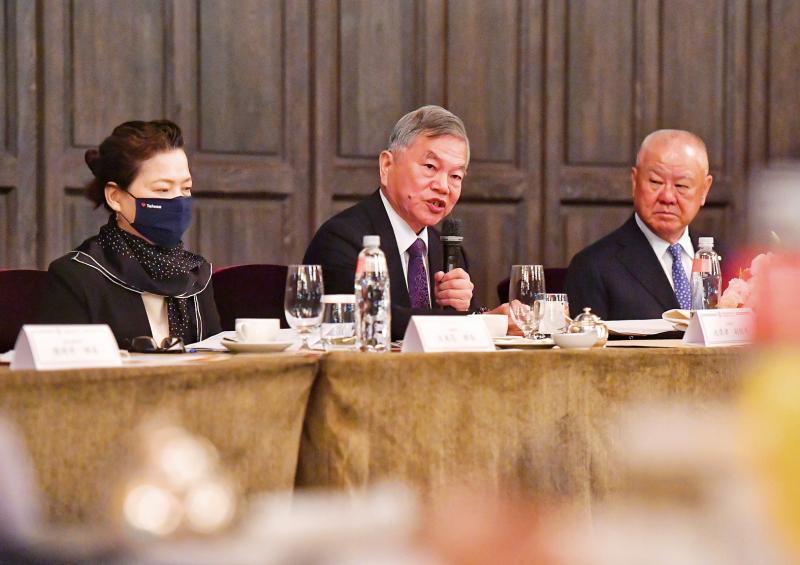Minister of Economic Affairs Wang Mei-hua (王美花) said she yesterday discussed an “economic bubble” for business travelers with Vice Premier Shen Jong-chin (沈榮津) and Minister of Health and Welfare Chen Shih-chung (陳時中).
Speaking at a breakfast meeting hosted by the Chinese National Association of Industry and Commerce, Wang said that businesses with “urgent affairs” that require the participation of foreign visitors in Taiwan can apply to the Ministry of Economic Affairs for assistance.
“Our plan is to apply to the Central Epidemic Command Center [CECC] in the order of urgency and necessity,” Wang said. “We will clearly lay out the number of visitors, how long they will be in Taiwan and the measures that will be taken to prevent the spread of COVID-19.”

Photo: CNA
Industry representatives at the meeting discussed the need for such a bubble with Wang, Shen and Chen.
“Right now we are focusing on business bubbles where foreign professionals apply on a case-by-case basis,” said Chen, who heads the CECC, adding that the center would consider countermeasure proposals by different government departments before considering regularizing such visits.
Wang said needs differ in terms of what visitors want.
“Some would like to be in and out quickly, others are willing to endure a quarantine to have more freedom of movement in the country,” Wang told reporters.
Wang said one idea floated by Shen at the meeting was to let commercial visitors conduct business while confined to a quarantine hotel.
Another possible measure would be to find those in the general population who already have COVID-19 antibodies to act as chaperones to ensure the compliance of anti-virus measures, Wang said.
The ministry has received a few, but urgent applications, she said, promising swift action.
“We will put together concrete measures before discussing them with the CECC, certainly before the end of the year,” she said.

The US government has signed defense cooperation agreements with Japan and the Philippines to boost the deterrence capabilities of countries in the first island chain, a report by the National Security Bureau (NSB) showed. The main countries on the first island chain include the two nations and Taiwan. The bureau is to present the report at a meeting of the legislature’s Foreign Affairs and National Defense Committee tomorrow. The US military has deployed Typhon missile systems to Japan’s Yamaguchi Prefecture and Zambales province in the Philippines during their joint military exercises. It has also installed NMESIS anti-ship systems in Japan’s Okinawa

‘WIN-WIN’: The Philippines, and central and eastern European countries are important potential drone cooperation partners, Minister of Foreign Affairs Lin Chia-lung said Minister of Foreign Affairs Lin Chia-lung (林佳龍) in an interview published yesterday confirmed that there are joint ventures between Taiwan and Poland in the drone industry. Lin made the remark in an exclusive interview with the Chinese-language Liberty Times (the Taipei Times’ sister paper). The government-backed Taiwan Excellence Drone International Business Opportunities Alliance and the Polish Chamber of Unmanned Systems on Wednesday last week signed a memorandum of understanding in Poland to develop a “non-China” supply chain for drones and work together on key technologies. Asked if Taiwan prioritized Poland among central and eastern European countries in drone collaboration, Lin

Renewed border fighting between Thailand and Cambodia showed no signs of abating yesterday, leaving hundreds of thousands of displaced people in both countries living in strained conditions as more flooded into temporary shelters. Reporters on the Thai side of the border heard sounds of outgoing, indirect fire yesterday. About 400,000 people have been evacuated from affected areas in Thailand and about 700 schools closed while fighting was ongoing in four border provinces, said Thai Rear Admiral Surasant Kongsiri, a spokesman for the military. Cambodia evacuated more than 127,000 villagers and closed hundreds of schools, the Thai Ministry of Defense said. Thailand’s military announced that

CABINET APPROVAL: People seeking assisted reproduction must be assessed to determine whether they would be adequate parents, the planned changes say Proposed amendments to the Assisted Reproduction Act (人工生殖法) advanced yesterday by the Executive Yuan would grant married lesbian couples and single women access to legal assisted reproductive services. The proposed revisions are “based on the fundamental principle of respecting women’s reproductive autonomy,” Cabinet spokesperson Michelle Lee (李慧芝) quoted Vice Premier Cheng Li-chiun (鄭麗君), who presided over a Cabinet meeting earlier yesterday, as saying at the briefing. The draft amendment would be submitted to the legislature for review. The Ministry of Health and Welfare, which proposed the amendments, said that experts on children’s rights, gender equality, law and medicine attended cross-disciplinary meetings, adding that